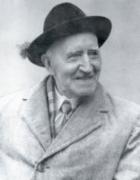Bulmer Hobson (1883 - 1963):
Writer and revolutionary
Bulmer Hobson was born in Holywood, County Down, and being a Quaker was educated at the Friends' School, Lisburn. He was an ardent admirer of Wolfe Tone and was to publish The Life of Wolfe Tone in 1919. He worked in the printing business in Belfast and began a club for boys which evolved into the Protestant National Society and was used to recruit young Protestants into the Nationalist Movement. He was secretary of the first Antrim County Board of the Gaelic Athletic Association but resigned and established Na Fianna Eireann. Constance Markievicz and he in 1909 expanded this club to a national scout organisation. The Ulster Literary Theatre had Hobson as one of its founding members, and he wrote a poetic drama, Brian of Banba. He was dissatisfied with Cumann na nGaedheal and began a club for which he wrote To the Whole People of Ireland: The Manifesto of the Dungannon Club in 1905. His weekly newspaper, the Republic, merged with the Peasant after six months. He was invited to America to introduce the Sinn Fein movement, and when he returned to Ireland Hobson amalgamated the Dungannon Clubs and Cumann na nGaedheal. He became Vice-President of Sinn Fein. He collaborated with F. J. Bigger and produced William Orr, which was one of a projected series of studies of prominent northern United Irishmen. In 1909 he published Defence of Warfare: A Handbook for Irish Nationalists. Because of policy disagreements in 1910, he left Sinn Fein and gave his time to the Irish Republican Brotherhood, for whom he started a newspaper, Irish Freedom. Bulmer Hobson was a founder member of the Irish Volunteers, and he published A Short History of the Irish Volunteers. He resigned in 1914 from the Supreme Council of the Irish Republican Brotherhood because of opposition from militant members. In 1916 he opposed the Easter Rising and his own Irish Republican Brotherhood colleagues arrested him and released him only when the rising had started. He withdrew from the revolutionary movement after the Rising and became involved in the Dublin Gate Theatre, in afforestation projects, and in writing of a non-political nature. When the Free State was established in 1922 he was appointed chief of the Revenue Commissioners' Stamp Department in Dublin Castle. Among his later writings are A National Forests Policy and Ireland Yesterday and Tomorrow.
|












